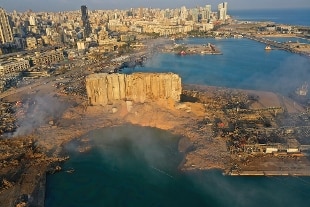- Beirut, explosions at the port: over 135 dead and 5 thousand injured
- Beirut the next day: images of devastation
- Lebanon, from the glories of the 70s to collapse
Share
06 August 2020 At least 137 dead and 5,000 injured in Tuesday's devastating ammonium nitrate explosions in a depot in the port of Beirut. The Lebanese Ministry of Health announced. The Lebanese government calls for the arrest of all those responsible for storage.French President Emmanuel Macron today in Lebanon to meet political figures to whom he will support the country after the devastating explosions in Beirut. The Elysée reports it. The arrival of the French head of state is expected at around 11 am (midday in Lebanon) in Beirut where he will be welcomed by Lebanese President Michel Aoun. Macron will then go to the port, the site of the explosions.
"Nobody knows the cause of the Beirut explosions," said Donald Trump , explaining that his administration works alongside the Lebanese authorities. Previously Trump had spoken of a "terrible attack", but the Pentagon has prepared to deny explaining that there is no indication that it was a terrorist attack.
"I remember a very strong, indescribable roar. The events followed one another very quickly. Immediately after the explosion, there was a moment of loss because the event was completely unexpected, but fortunately we are all well." To say it was Roberto Caldarulo, the Italian soldier slightly injured in the explosion at the port of Beirut. "I saw after I had a little blood on my hand, but nothing transcendental," he added. "The thing that worried us and still worries us is the situation of the Lebanese population. We lived it, but we are were really lucky, while many other people unfortunately not, "he added.
"Beirut is crying, Beirut is screaming, people are hysterical, they are tired," said director Jude Chehab to the BBC, asking those responsible to appear before justice.
"In this country strangled by the economic crisis, tried by Covid and now hit in the heart, there are all the elements for a revolt". To say this, interviewed by La Repubblica, is the Lebanese economist Sami Nader , director of the Levant Institute for Strategic Affairs and professor at UsJ University in Beirut.

